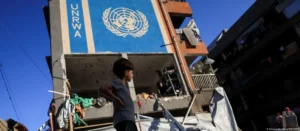Germany, having recently ended a contentious 18-month freeze on asylum decisions, is now facing growing pressure to grant full refugee status to Palestinians amid rising civilian casualties from Israel’s actions in Gaza.
Shafiq, a Palestinian, found himself in legal limbo after escaping Gaza and traveling through Egypt and Turkey to Germany, where he applied for asylum.*
Germany’s constitution guarantees the right to asylum for individuals facing persecution based on race, religion, nationality, political views, or belonging to a specific social group.
However, 65-year-old Shafiq arrived just months after Germany’s Federal Office for Migration and Refugees (BAMF) suspended asylum processing in January 2024.
“I didn’t know. I wasn’t sure why they weren’t giving me papers,” he said. “I sent a letter. Maybe six months later, they responded, saying they had to wait to assess the situation in Gaza.”
Asylum Applications for Palestinians “Deprioritized”
Human rights organizations, lawyers, and some opposition politicians criticized BAMF’s justification for pausing applications like Shafiq’s. BAMF cited Article 24 of the German Asylum Law, which permits delays in decision-making during periods of temporary uncertainty.
At the time of the freeze, over 24,000 Palestinians had already been killed in Israel’s military operations in Gaza, according to local health authorities.
In a statement to DW, issued alongside the Interior Ministry, BAMF admitted that asylum applications from Gaza had been “deprioritized” within the administration. The reasons given included the October 7, 2023, Hamas attack on Israel and the resulting conflict, as well as the lack of reliable information about persecution faced by civilians in Gaza.
Courts Side with Palestinian Applicants
Legal challenges were filed against BAMF’s inaction, with most courts ruling in favor of the applicants. By April 2025, German courts had issued rulings in support of Palestinian plaintiffs in 187 cases.
In July 2025, the Interior Ministry confirmed that the freeze had been lifted, stating that the situation in Gaza was no longer considered “uncertain.”
However, refugee rights group Pro Asyl argued that the freeze should never have happened. “The reality in Gaza shows that people are constantly at risk of becoming victims of Israeli military actions simply because they are present there,” said Peter von Auer, the group’s legal affairs spokesperson.
Berlin-based human rights lawyer Alexander Gorski also condemned BAMF’s stance as “absurd,” calling the claim of an unclear situation both politically convenient and deeply inhumane.
As of February 2024, around 1,100 asylum cases from Palestinians across the territories were pending with German authorities. With the blockade of Gaza making it nearly impossible to leave, many Palestinians fleeing the region attempt to reunite with family members abroad. In 2024, Germany received 634 asylum applications from Palestinians, a number that dropped to 185 in the first half of 2025.
Refugee Status vs. Subsidiary Protection
The Refugee Council of Lower Saxony is currently assisting Palestinians from Gaza and the West Bank in pursuing full refugee status.
Historically, many Palestinians have been denied full refugee protections under the Geneva Convention due to their unique legal status. Palestinians are the only refugee group served by a separate UN agency—UNRWA—tasked with providing aid and support.
Established in 1949, UNRWA operates in Gaza, the West Bank (including East Jerusalem), Jordan, Lebanon, and Syria, and was originally intended as a temporary agency for displaced Palestinians following the creation of Israel.
Germany typically grants “subsidiary protection” to individuals who don’t meet the criteria for asylum or refugee status but who still face serious risks such as torture, execution, or indiscriminate violence if returned to their country.
However, with the Israeli parliament now barring UNRWA from operating in Gaza, German legal experts and advocacy groups are questioning whether subsidiary protection is still appropriate. Article 1D of the Geneva Convention stipulates that if UNRWA is no longer able to assist, Palestinians are entitled to full refugee protections.
Caroline Mohrs, a lawyer and spokesperson for the Refugee Council, pointed to a European Court of Justice ruling from June 2024 supporting that interpretation.
In Germany, refugee status offers significant advantages, including the possibility of obtaining permanent residency after three years, compared to a five-year minimum for those under subsidiary protection. Refugees also have a higher chance of being approved for family reunification programs.
Yet, in June 2025, the new coalition government—formed by the CDU, CSU, and SPD—announced a two-year suspension of family reunification rights for individuals holding subsidiary protection status.

Left Party parliamentarian Clara Bünger has also called for Palestinians fleeing Gaza to be granted full refugee status upon arrival in Germany. “Subsidiary protection is often viewed as temporary,” Bünger, who serves as her party’s spokesperson on interior affairs, told DW. “But people need a long-term solution. One thing is certain: no one can return to Gaza, to that strip of land.” As a lawyer herself, she is urging authorities to process pending asylum applications “quickly and fairly.”
Shafiq, meanwhile, remains uncertain about the future of his asylum case. A social worker and father of four, he left Gaza in 2022 in hopes of finding a better life and medical care for his ailing daughter.
Tragically, after he left, his 26-year-old daughter died of cancer, and his youngest son was killed in an Israeli airstrike, he told DW. Two of his adult children have made it to Europe—one to Germany—but authorities did not allow him to live in the same town as his son. His wife still resides in Gaza, now living in a tent after their family home was destroyed in the military assault.
Shafiq doesn’t know if he will be allowed to remain in Germany, but he is certain of one thing: “There is no future, no safety, nothing in Gaza.”
